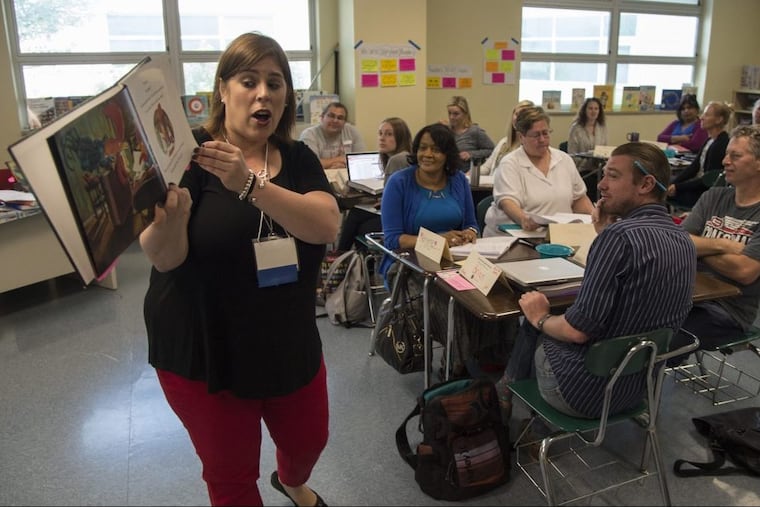At summer school, teachers learn best methods to increase literacy
"By the end of third grade, [students are] at the point at which they need the foundation to master the more complex curriculum in fourth grade," said Diane Castelbuono, the school district's deputy chief of early childhood education.

Stacy Dougherty stood before her class on Tuesday and asked if anyone knew the meaning of "to interrupt." Then, she began reading aloud from David Ezra Stein's Interrupting Chicken, a book about a young chicken that keeps interrupting her father as he tries to read her bedtime stories.
"So the chicken has interrupted all of the father's stories. What's going to happen next?" Dougherty asked.
Dougherty, a kindergarten teacher at Clara Barton Elementary in Feltonville, was addressing a room full of her peers at Fels High School as part of the district's 2017 Early Literacy Summer Institute, where teachers this week are learning the best methods to get more 8-year-olds reading on grade level by 2020. Currently, about 30 percent of eightth graders are reading on level.
Emphasis on literacy is important because "by the end of third grade, [students are] at the point at which they need the foundation to master the more complex curriculum in fourth grade," said Diane Castelbuono, the Philadelphia School District's deputy chief of early childhood education.
Donna Frisby-Greenwood, president and CEO of the Fund for the School District of Philadelphia, which helps fund the institute, agreed, saying students not reading on grade level by age 8 are more likely to fall behind and drop out.
Teachers said they found the training useful. "I felt like this was a really great learning opportunity," said Amanda Feurtsch, a third-grade teacher at Vare-Washington School, and one of 1,000 teachers from 57 schools attending the training. "I personally see a lot of this being very easy to incorporate in my classroom."
Instruction at the Literacy Summer Institute, which began Monday and runs through Friday, focuses on giving teachers the tools to implement techniques that have been proven to increase literacy. Each day begins at 8 a.m. with a keynote speaker, usually an educator with a background in teaching literacy. Afterward, teachers attend three interactive sessions. Workshops include presentations on reading aloud to students during the literacy block — two hours now dedicated to literacy instruction; on developing stronger writers; and on using data to inform literacy instruction.
Presenters tailor each session towards the district, demonstrating teaching methods and allowing teachers to share their experiences in the classroom. The day ends at 4 p.m., after teachers and administrators discuss ways to implement these methods in the classroom.
"At the end of this, every K-to-3 teacher will have received this training," Frisby-Greenwood said of the institute, which has been held for the last three years. "The comprehensiveness of this [program] allows any student in the School District of Philadelphia to be touched by it."
She added that after each school goes through the Summer Institute, it receives a library and a literacy coach to assist teachers throughout the year. Grants from the Lenfest Foundation and the William Penn Foundation help to support the institute and the literacy initiatives, in addition to what is provided by the Fund for the School District.
Allisa Davis, a veteran kindergarten teacher at A.D. Harrington Elementary in West Philadelphia, said the Literacy Summer Institute is helping teachers hone their skills.
"They're giving you information about what we're supposed to do and how to improve what we're doing," she said. "So, I feel like they're breaking it down each day so it's giving you opportunities to take it in and go back to schools and implement it with fidelity."